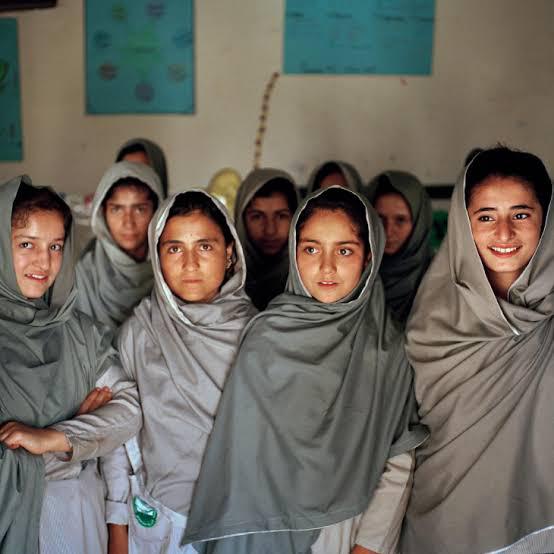Afghan businessman Zahid Amini is worried about her daughter’s education in Pakistan after Islamabad began the forced expulsion of Afghan refugees on Nov. 1, the deadline set for all undocumented immigrants in the country.
Following the Pakistani government’s abrupt and decisive decision to ask all undocumented immigrants to leave the country within a month, Amini is upset, confused, and unsure how to handle his daughters’ education. Though the Islamabad announcement did not specify the country of origin, those arrested in the last two weeks and transported to borders with Afghanistan clearly indicated that it is only for Afghans.
The Afghan small businessman is one of those affected by the forced expulsion decision since he has already sacrificed by splitting the family into two, one living in Afghanistan’s capital of Kabul with his sons and the other with his wife and two daughters in Peshawar, capital of the northwestern Khyber Pakhtunkhwa province, who have been studying in a private English medium school for over two years.
He, like many Afghan middle-class families, has concerns about their daughters’ education in Kabul and other major cities in Afghanistan following the interim Taliban administration’s ban on girls’ education from grade 7 upwards after their return to power in August 2021.
Afghan Taliban, calling their interim government Islamic Emirates, allowed girls education up to grade 6, closing the door for younger girls to continue their education due to their own version of Islam, which has been criticized not only by Western countries, against whom they successfully fought for nearly 20 years, but also by neighboring Islamic countries, including Iran and Pakistan.
Amini and thousands of other middle-class Afghans are sacrificing financially and emotionally for their daughters’ education in better schools in Pakistan, sending them to either Peshawar or Quetta, the provincial capital of southwestern Balochistan province.
The Afghan entrepreneur, who works in the dry fruit export business, usually visits Pakistan once a year to see his wife and daughters and spend time with them, though he complains that getting a Pakistani visa now takes a long time after applying online.
“My family shifted to Peshawar and has been living in a rented house there for over two years. They did overstay after their visas expired, but they live normal lives like local women and girls, and they are never asked for their documents,” he explained over the phone.
“I’m completely baffled… How will my daughters continue their education if they return to Kabul? And if they stay, they will have to live with the fear of being forced to return to Afghanistan,” he added.
“Now Allah helps us as this situation is very confusing,” he said.
This confusion exists in many Afghan families who can afford their daughters’ education in good private English medium schools in Pakistan because such facilities are unavailable to Afghans in other neighboring countries.
With no clear policy from the Pakistani government regarding Afghan families who are staying in the country for their daughters’ education and contributing to the national economy, the Afghanistan interim government has also no clear policy regarding the girls’ education of those returning.
“The girls up to grade 6 can take admission in schools and continue their education without any problem,” said Ameer Khan Muttaqi, the Afghan interim foreign minister, in response to a question in an interview with BBC Pashto.
When asked what about girls studying in middle and high schools in Pakistan and now their return to Afghanistan, he avoided answering by repeating Taliban administration rhetoric since they first banned university girls from attending their classes amid protests in several parts of the country in September 2021, saying “Our elders are still in the process of making a policy for younger girls’ education within the ambit of Islam.”
The Kabul administration has faced numerous challenges since regaining power, including the economy, law and order, terrorism, and natural disasters such as floods and earthquakes. The administration is now facing a major challenge in dealing with the influx of Afghans returning to the country.
Though the Afghan administration has established camps for 50,000 refugees near the Torkham and Chaman borders, it is unable to handle the situation because over 200,000 of the total 1.7 million undocumented refugees have returned to their country in the first 10 days of their forced expulsion by the Pakistani government, with some of them returning for the first time in 43 years, when they were welcomed by Islamabad following the former Soviet Union invasion of Afghanistan in 1979.
Some social media posts shared on X show people entering Afghanistan, crying for injustices done to them by the Islamabad administration, including leaving behind holdings such as properties, shops, and even money because Pakistani authorities on borders do not allow money more than Rs 50,000 (approximately $180), which is not enough to start a new life in their country.
“The way these Afghans are being sent by Pakistan is full of difficulties for them [refugees] and insulting,” Muttaqi said in the same interview, requesting Islamabad to review its decision.
The minister also questioned why the Pakistani government is doing so when the Afghan Taliban have established an Islamic government that is progressing and providing better living conditions for Afghans. The question has no clear answers for Islamabad’s interim government, whose primary responsibility, according to the country’s constitution, is to hold general elections within 90 days and not to make policy decisions.

